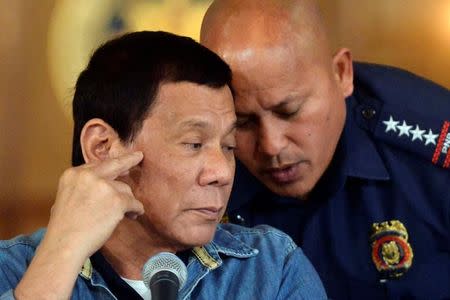Philippine ministry asks Duterte to clarify military's role in drug war

By Karen Lema and Martin Petty MANILA (Reuters) - The Philippine defence ministry on Wednesday asked President Rodrigo Duterte to issue an order for the military to play a role in his war on drugs, including granting troops powers to arrest "scalawag" police. The ministry asked Duterte to formalise remarks he made in a speech to army generals on Tuesday, when he said he needed their help in his drugs war, and to detain members of a police force he described as "corrupt to the core". The ministry asked for "an official order regarding this presidential directive to serve as a legal basis for our troops to follow". "By the same token, the president's verbal directive to arrest 'scalawag cops' should also be covered by a formal order," the ministry said in a statement. Duterte's police chief ordered the Philippine National Police (PNP) on Monday to suspend their anti-drugs operations after the killing of a South Korean businessman by rogue drug-squad police. Duterte is infuriated and embarrassed by the incident, which he said had "international implications". His suggestion that the military should fill the void left by police marks a stunning change of tack by the former city mayor, who had steadfastly backed the police amid allegations from human rights groups and some lawmakers they were operating with impunity. It was not clear why the ministry made public its request to Duterte. Any grant of powers of arrest to the Armed Forces of the Philippines (AFP) would require an executive order, or a declaration of martial law. The volatile president has recently threatened to declare martial law to help the drugs crackdown, but has also ruled it out several times. The Philippine Drugs Enforcement Agency, a body a fraction the size of the PNP, takes over the lead in fighting drugs and Duterte has said he needs the military's help. Agency spokesman Derrick Carreon said it was up to the challenge and had already consulted the armed forces. POLICE SCRUTINY The military has been thrust into the spotlight as the police force faces intense scrutiny of a kind not seen since Duterte took office with promises to protect officers fighting the drugs scourge. The rights group Amnesty International said in a report on Wednesday that police had behaved like the criminal underworld they were supposed to be suppressing, taking payments for killings and delivering bodies to funeral homes. Killings during Duterte's campaign appeared to be "systematic, planned and organised" by authorities, it said. The PNP rejected the report's findings, saying it upheld respect for human rights "as a fundamental principle in policing". In a statement, it said allegations of violations were inevitable "in cross-swords engagement or armed contact with criminal elements". More than 7,600 people have been killed during the seven-month crackdown, more than 2,500 in operations that police said had ended up in shootouts. Many of the remaining deaths are attributed to vigilantes and turf wars. It was not immediately clear what role the military might play in the anti-drugs campaign. Duterte told a dinner function late on Tuesday his plan would involve a small number of military. "It's only the armed forces selected few, and the PDEA can operate now against drugs," he said, according to a transcript his office provided on Wednesday. Asked if Duterte would issue an order as requested by the defence ministry, his spokesman, Ernesto Abella, said in a text message, "That is standard operating procedure," but did not elaborate. Senator Leila De Lima, a staunch critic of Duterte, said bringing in the military was a bad idea. "The solution is to stop the killings, and not call out the AFP to do the killings that the PNP has supposedly ceased," she said in a statement. (Editing by Clarence Fernandez)

